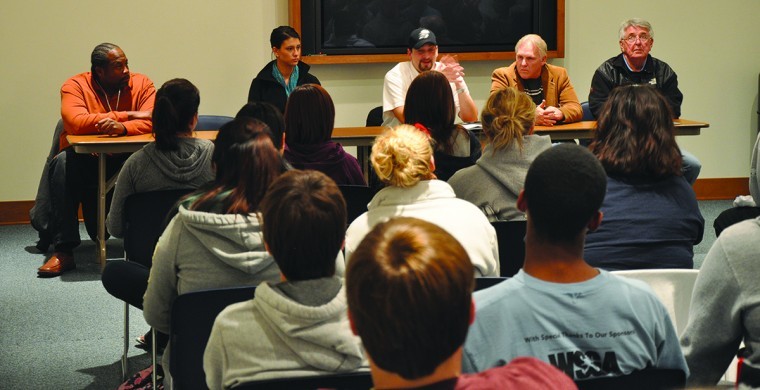Lawrence shelter tells its story at Washburn
November 13, 2012
Stereotypes were broken and stories were told during Tuesday night’s Faces of Homelessness Panel discussion in the Shawnee Room of the Memorial Union. Approximately 50 people gathered to hear members of the Lawrence Community Shelter discuss the problem of homelessness in the Topeka/Lawrence area, and share stories of their own experiences.
“A lot of people think of homeless people as a person who likes to get drunk and not do anything,” said Dustin Allen, a 10-year employee of the shelter. “That’s so far from the truth it’s not even funny.”
The event began with Elizabeth Stevens, director of family programs at the shelter, telling a story about a young girl who has suffered through an abusive life. Stevens encouraged the audience to close their eyes, and imagine this girl live through homelessness and domestic abuse.
At the end of the story, Stevens asked the audience to describe the mental image they had of this girl. After getting some feedback, Stevens revealed who the girl was.
“That girl was me,” said Stevens. She then continued the story, explaining how she escaped from her abusive older boyfriend, got employed as a model and traveled around the world–away from her abuser.
“When I came back, I found a sense of self that I only could’ve found if I left the country,” said Stevens. “Everything I knew here was chaos.”
According to Stevens, her abuser is now in prison in Alaska. Stevens has three young children and a loving husband.
“I’m going to quote ‘The Waterboy’ here: find your tackling fuel,” said Stevens. “Find what is going to drive you.
Laughs permeated the heavy topic, to lighten the mood and bring the discussion into a different light. “Happy Birthday” was sang in the style of Elvis Presley to junior Angelique Flinn, by shelter case manager Brian Blevins. However sad or humorous, the main focus of the evening’s discussion was breaking stereotypes and telling stories.
“When you see homeless people, I hope you don’t judge them by their actions,” said James Gaillard, a friend of the Lawrence Community Shelter.
Gaillard shared his personal life story, as did the five other panel members. Gaillard, an Army veteran from Operation Desert Storm, was discharged from the military for marijuana use. He would later be diagnosed with Post Traumatic Stress Disorder, and was homeless off and on for many years.
“In war, you see things you don’t want to see,” said Gaillard. “I turned to things like marijuana and cocaine to ignore those things.”
After falling back on God and his faith, Gaillard decided to do something positive with his life, and give back to others who might be struggling with similar situations.
“I’ve crawled out of this stagnant life I used to live,” said Gaillard. “Only doing something positive could actually help me stay where I want to be.”
Gaillard is one of 23 full-time staff members of the Lawrence shelter, which is currently undergoing a change in location. The current shelter, located on 10th and Kentucky in Lawrence, has been over-populated for three years, and has served 726 people so far this year. The Topeka Rescue Mission serves about 2,000 people a year, in comparison to Lawrence’s projected 1,000 for 2012.
The new shelter in Lawrence is a 25,000 square-foot complex with an additional four acres of open ground, for a playground and like items. This new address is 3701 Franklin Park Circle, on the east edge of Lawrence. It will remain the only emergency homeless shelter in Douglas County.
“We’ve got resources out our ears,” said Brian Blevins, a case manager at the shelter. Blevins shared his story as well: abused as a child, recovering alcoholic, and who could have been a successful country-western singer.
“I was non-functional, I drank to oblivion,” said Blevins. He went through 13 treatment facilities for alcoholism. After sobering up and getting a degree from the University of Kansas, he came back to work at the shelter. “I am Brian Blevins again. I don’t know who that other monster was.”
The discussion was not solely aimed at Lawrence issues. Topeka’s homeless problem–and ways that the community is combating it–was also discussed. The Topeka Police Department employs a project called Crisis Intervention Training, which, according to Dustin Allen, works.
“The differences between officers who have taken the training and have not are huge,” said Allen. “It’s basically a crisis diversion service. It teaches officers how to handle situations differently, and with certain things in mind, such as mental illnesses.”
According to the panel members, poverty and homelessness in Douglas County is criminalized, and folks who sleep on the street are often ticketed. This adds layers of problems for people who cannot afford basic shelter, let alone a loitering ticket.
“You’ll know we’ve done better as a culture when we don’t have payday loan places anymore,” said Blevins.
The main theme of the discussion: community involvement. According to the panel members, the community within the shelter, as well as the surrounding area, is equally important to the success of Lawrence Community Shelter and Topeka Rescue Mission alike.
“We goof around a lot, but we cry a lot too,” said Blevins. “We invest a lot of love in clients.”
“Everyone here is family, we see ourselves as a family,” said Stevens. “I can go to anyone here, and they’ll be warm and accepting.”
“If you don’t serve the poor with love, they will hate you for it,” said shelter director Loring Henderson.
The Lawrence Community Shelter has had a long-standing internship program with Washburn. This internship is available for students focusing on programs related to social work, and have a strong interest in helping others. They have four interns for this academic year, but are open to new applicants and students of all majors.
For more information, visit www.lawrenceshelter.org, or contact shelter director Loring Henderson at 785-832-8864.




